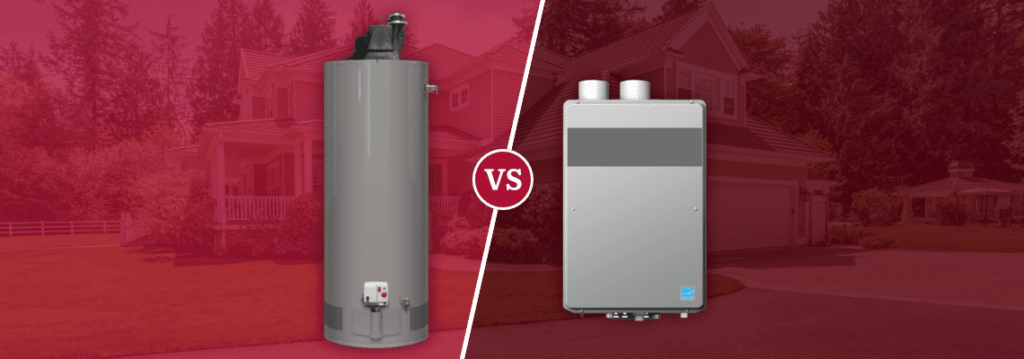
Looking to replace your home’s water heater but not sure where to start or what your options are? You’re not alone, which is why our Wolfer’s team is here to help! Homeowners choose one system over the other for various reasons like size, energy efficiency, and cost. Our team wants to ensure you are fully versed in the pros and cons of both tankless & tank water heaters before you make the investment. Keep reading to find out which system is the BEST for you and your home’s needs.
Energy-Efficiency
Tankless: Overall, tankless systems are more efficient than a traditional tank water heater. This is because they produce hot water on demand rather than a tank system that is constantly heating its limited water supply. The EPA estimates that a tankless water heater uses up to 34% less energy than a storage-tank water heater if you use 41 gallons or less of hot water daily. If the household uses closer to 86 gallons of hot water a day, a tankless water heater will be up to 14% more efficient.
Tank: Unlike tankless systems, tank water heaters are constantly heating hot water, whether you need it or not. This can result in a higher utility bill and higher energy usage! While the initial upfront cost may be lower, it’s guaranteed that you will make that cost difference up in monthly expenses.
Cost & Installation
Tankless: Tankless water heaters tend to cost more upfront with the average price being around $2,637 in the Portland area. They are a bigger investment but they have long-term payoffs, such as increased efficiency, which can save you money in the long run. Tankless systems also require professional help when it comes to installation to stay within warranty requirements.
Tank: Tank water heaters are more cost-effective when it comes to the initial purchase. The typical range to replace a tank water heater is between $831-$1651 in the Portland area. Like a tankless system, tank water heaters also require a professional when it comes to installation to stay within warranty requirements, but do not have as complex of an installation process as a tankless system.
How They Operate
Tankless: As the name suggests, a tankless water heater doesn’t require a tank reserve to store hot water, which can help you save on space. Water is only heated when you turn on a water supply. How does that happen? Well, as water passes through the heat exchanger unit, it gets heated. The ability to heat water on demand eliminates unnecessary energy loss in your home, which will be reflected in your utility bills as time goes on.
Tank: Most homes still use traditional tank storage water heaters. These water heaters are highly insulated to prevent the stored hot water from losing heat. They usually come preset to 140 degrees but can be adjusted. During the heating process, water enters the tank through the inlet and passes through a series of heated pipes, or a heat exchanger unit. After reaching the desired temperature, it moves to the holding tank for storage until the time you’ll need it. Tanks do not produce an endless hot water supply, and you may have to wait for the tank to fill up again if all of the hot water was used by someone else in the household. A tankless water heater may be a wise investment if you have a large family with heavy hot water usage.
Call Your Trusted Plumber
Now that you know the main differences between a tank and a tankless system, you can make an informed decision on which system fits your home’s needs! Still not sure which system is best for you? Don’t worry! Our Wolfer’s team is EXPERTS in the field of water heaters and we are happy to help! We can’t wait to provide you with water heater solutions that are SECOND TO NONE. Give our team a call today at 503-220-1901 or request your appointment online »

